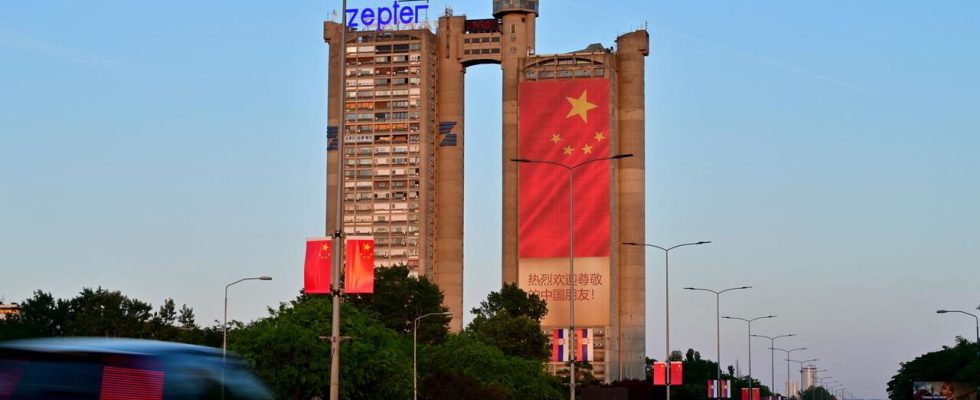China’s state and party leader Xi is traveling to Serbia and Hungary. He doesn’t have to face any critical questions there, just a wealth of investment wishes. The timing of the trip is also no coincidence.
It is obvious: Xi Jinping is visiting friends in Belgrade. Because on the way from the airport to the Serbian capital, China’s state and party leader Xi Jinping has to pass Belgrade’s “West Gate”, a remarkably ugly high-rise building of Yugoslav brutalism in the 1980s. A huge red Chinese national flag covers the right wing of the two-part Genex Tower – with an oversized welcome greeting in Chinese. Genex, that was the state-owned Yugoslavian import-export company. That also fits.
Serbia and China share an “iron friendship,” according to both Beijing and Belgrade. The Serbian population already knows this; it has been part of the Serbian vocabulary at least since 2016. At that time, China invested heavily and directly in Serbia for the first time and bought the steelworks in Smederovo, saved it from bankruptcy and expanded it – 5,000 stable jobs for 8 years, as Vucic praises.
China is now Serbia’s second most important trading partner. According to Serbian President Aleksandar Vucic, the trade volume between the two countries was $6.1 billion in 2023. Serbia’s exports to China have also multiplied in recent years, he enthuses – from a manageable $6.4 million in 2012 to $1.2 billion a year 2023.
Ask for investments
But there is more, Vucic may think – and makes “three requests” to Xi Jinping on Serbian state television; three promising business areas in which China should invest in Serbia: Firstly, Serbia’s railway factories are being laboriously revived because the demand for trains on the European market is becoming ever greater, so that neither the German Siemens Group nor the Swiss Stadler Rail can deliver enough. But the Chinese could do that – preferably together with Serbia.
Second on Vucic’s wish list: China’s know-how in the areas of artificial intelligence and electromobility, for which Serbia could act as a construction site and place of operation for e-cars, e-taxis and air taxis. The friends from Beijing have already invested a lot in their neighbor Hungary. Then the rest from president to president, personally.
Aleksandar Vucic and Xi Jinping shaking hands in 2017: At that time, Serbia’s president visited Beijing.
Orban, the “panda hugger”
Xi comes from France, Hungary is only the last stop on his European trip, before that there is a stopover in Serbia. Both stops are more of a feel-good program at the end of the small European tour. Serbia is the largest of the Western Balkan countries, all of which would actually like to be EU members – Serbia has been a candidate for membership for 12 years. Hungary has been an EU member for 20 years, but under Prime Minister Viktor Orban maintains political friendships that irritate many EU partners.
Orban is considered a “panda hugger” in China, a loose description for friends of Beijing. Hungary, like Serbia, is part of the “New Silk Road”, China is building and investing in new trade routes and sales channels for its own economy. This includes motorways and an express railway line between Belgrade and Budapest.
The Orban government is also increasingly attracting Chinese car manufacturers: Hungary is intended to become a hotspot for the car industry in Europe and does not want to only be dependent on the large German car companies Audi, BMW and Daimler-Benz. “Maintain good relations with as many countries as possible,” is how Orban’s chief of staff Gergely Gulyás puts it in a friendly manner.
Commemoration of NATO bombing
Strategic partnerships, shuffled cards for political poker rounds. Serbian China expert Stefan Vladisavljev calls it “multi-vector foreign policy”: a balancing between West and East, Europe and Asia. Geopolitics with concessions, give and take.
Serbia signed a free trade agreement with China six months ago and it is due to come into force in July. “Taiwan is China, period,” says Vucic on Chinese state television, in line with those in power in Beijing. And in return, expects the same when it comes to Kosovo: a former Serbian province, an independent country since 2008 that is not recognized by Serbia – and of course not by China either.
But Xi is not just coming to Belgrade as a traveling salesman. Nobody believes it is a coincidence that he ends up in Belgrade exactly 25 years to the day after the bombing of the Chinese embassy in Belgrade. During the Kosovo War in 1999, NATO bombs dropped by US Air Force fighter bombers hit the embassy. Three Chinese journalists were killed.
The then US President Bill Clinton expressly apologized and NATO claimed that the bomb hits were an accident. China did not accept this apology. This will also be remembered during the state visit. “Fuck NATO” and “Fuck EU” are graffiti that are repeatedly noticed on house walls in Belgrade. Of course not at the “Genex Tower”.

